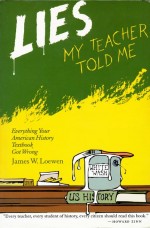
So you got a good high school education, did you? Quick: What was Helen Keller’s political persuasion? How did Patrick Henry feel about slavery? What was the inspiration for Hitler’s concentration camps? Be careful how you answer, for as James Loewen points out in blistering detail in Lies My Teacher Told Me, the textbooks we’ve taken as gospel during our pre-college years don’t always tell the full story, the rest of the story, or even the real story.
It seems ludicrous that educational literature-the books designed to be young people’s primary link to their pasts-would deliberately mislead their audiences, but upon closer inspection, the idea is not so far-fetched. The stated purpose of most American History textbooks is to tout the honor and glory of the American nation…er, well, um…except for that part where we stole the Indians’ lands and tried to exterminate their societies. Oh, and maybe that whole slavery thing…and those socio-political leaders with unsavory attitudes or beliefs…and those embarrassing episodes of grave-robbing by our pious Puritan forefathers. It quickly becomes plain that there is an awful lot of history that doesn’t make the United States, or the Europeans who settled it, look either honorable or glorious. And so the authors of these textbooks are left in a quandary: how do they portray controversial historical events in a way that makes our Illustrious Leaders look like the good guys instead of opportunistic racists, or worse still, complex human beings with shortcomings and strengths?
The answer is a gargantuan bucket of whitewash. As Loewen points out time and again, textbooks don’t like uncertainty. It undermines that omniscient authorial voice they are so fond of employing, and it hints that the past might not be quite as cut-and-dried as one would like. Consequently, in situations wherein there is more than one explanation for events, these books avoid mentioning the controversy, choosing instead to simply pick one explanation and present it as fact. Other times, red-letter words like “racism,” “cultural imperialism,” or “white supremacy” are omitted entirely. But what happens when the patriotic authors encounter an incident or a character with such overtly negative overtones that they cannot be ignored or overlooked? Often, the potentially disillusioning material is buried within a more innocuous paragraph or hidden in an ambiguous clause, where only the most careful readers will ever notice it.
An example of this practice is found in the textbooks’ discussion of the plague (generally thought to have been brought to the Americas by pre-colonial British and French fishermen) that swept through the indigenous populations of coastal New England, killing 90%-96% within three years. The result of this horror was that the Pilgrims stepped ashore in Massachusetts onto an almost deserted land, with abandoned Indian villages, plowed fields, and cleared land waiting for them; had they been obliged to clear and plant the land themselves, they would have had a much more difficult time, but as it was, they simply moved in. One would think that so great a factor in the relative ease of European settlement would make for some mention, and so it does: “[Loewen’s] college textbook [mentions] it-in a fourteen-word passage nestled within a paragraph about the Pilgrims’ belief in God.” By marginalizing the fate of the Native people who originally settled North America, the authors of these texts have reinforced a not-so-subtle Eurocentric attitude in their readers while simultaneously maintaining the Primitive Savage-Civilized European dichotomy that has characterized our view of American history and White-Native relations.
Lies My Teacher Told Me tackles the myths and misconceptions of our high school history courses with humor, intelligence, and irreverence. Loewen’s method is simple: he reviews 12 popular texts and quotes the ways in which each attempts to weasel out from under uncomfortable topics, but his analysis does not stop with mere criticism. Rather, he goes on to give us the real version of events, using primary sources, such as contemporary accounts, letters, and diaries, and reputable secondary sources. He also discusses the “why” of this egregious lack of scholarship in our textbooks and ways in which to improve, and warns that the inevitable result of creating bland, homogenized, “feel-good” history is a generation of snoring students. It is, he emphasizes, the conflicts and personal voices that make history so enthralling, and by smoothing over all the rough spots in our heritage, textbooks have denied their audiences the fun of personal contact with the past.
If all this sounds like yet another “bor-ring” history lesson, consider the following. Helen Keller was a radical socialist who worked tirelessly for social change; Patrick Henry, while conflicted about it, owned scores of slaves by the time he died, and did not free any of them, despite his passionate defense of liberty; and Hitler was greatly impressed by the United States’ concentration camps for Native Americans in the west, “often prais[ing]…the efficiency of America’s extermination-by starvation and uneven combat.” He used our “warfare” with the Indians as a model for his campaign against Jews and Gypsies.
Are you sure you know your history? To check the facts again, try Lies My Teacher Told Me by James Loewen, Legends, Lies, and Cherished Myths of World History by Richard Shenkman, and An Underground Education, by Richard Zacks.






